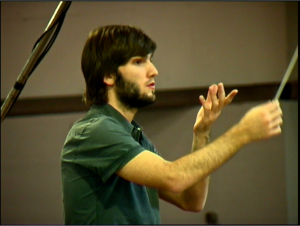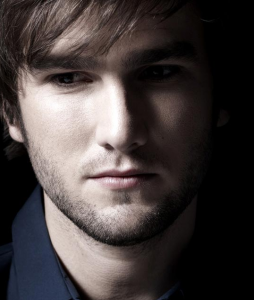 Lucas Vidal has started to work on the music for the upcoming biopic jOBS. The drama stars Ashton Kutcher as Steve Jobs and covers the iconic Silicon Valley visionary from his early years as an impressionable youth and wayward hippie, through his initial successes and infamous ousting, to his storybook return and ultimate triumphs as a man who set out to change the world and did just that. The film is directed by Joshua Michael Stern and co-stars Josh Gad (Love and Other Drugs) as Apple co-founder Steve Woznikak and Matthew Modine will be portraying John Sculley, Apple’s CEO from 1983 to 1993. Dermot Mulroney, Ahna O’Reilly, Ron Eldard, John Getz, Lesley Ann Warren and James Woods are also starring in the drama. Matt Whiteley has written the screenplay and Academy Award-nominated cinematographer Russell Carpenter (Titanic) is also involved in the project. Mark Hulme and Marcos Rodriguez are producing the Five Star Feature Films production. Stern has previously collaborated with composers John Debney and Philip Glass on his other features (Swing Vote, Neverwas). jOBS is set to be released in late fall of 2012. For updates on the film, visit the official movie website.
Lucas Vidal has started to work on the music for the upcoming biopic jOBS. The drama stars Ashton Kutcher as Steve Jobs and covers the iconic Silicon Valley visionary from his early years as an impressionable youth and wayward hippie, through his initial successes and infamous ousting, to his storybook return and ultimate triumphs as a man who set out to change the world and did just that. The film is directed by Joshua Michael Stern and co-stars Josh Gad (Love and Other Drugs) as Apple co-founder Steve Woznikak and Matthew Modine will be portraying John Sculley, Apple’s CEO from 1983 to 1993. Dermot Mulroney, Ahna O’Reilly, Ron Eldard, John Getz, Lesley Ann Warren and James Woods are also starring in the drama. Matt Whiteley has written the screenplay and Academy Award-nominated cinematographer Russell Carpenter (Titanic) is also involved in the project. Mark Hulme and Marcos Rodriguez are producing the Five Star Feature Films production. Stern has previously collaborated with composers John Debney and Philip Glass on his other features (Swing Vote, Neverwas). jOBS is set to be released in late fall of 2012. For updates on the film, visit the official movie website.
The film marks yet another major scoring assignment for the Spanish composer who just had his wide US release debut this spring with the John Cusack-starring period thriller The Raven and who also scored the action thriller The Cold Light of Day starring Henry Cavill and Bruce Willis, which opened in Europe this spring and is scheduled to be released in the US in September. As reported last month, Vidal also has Hammer Films’ The Quiet Ones starring Sam Claflin and Jared Harris coming up. It has been announced a couple of weeks ago that the Spanish box office hit Sleep Tight (Mientras Duermes), which the composer scored last year, has been picked up for US distribution by MPI’s Dark Sky Films and will be released in theaters this fall. Check out our exclusive interview with Vidal on his most recent scoring assignment below.

How did you get involved in the project?
Josh, the director, came to our studio in Santa Monica for an initial meeting about two months ago. Being a true artist, he had an amazing vision about the music for jOBS. The script has a great rhythm and there are a lot indications for music already, acknowledging how music was such a big part of Steve Jobs’ life. We bounced many ideas off of each other very quickly during what turned out to be a very energetic meeting. Then I played at the piano to show him what I thought could be the main theme. He immediately responded, “it is jOBS’ theme”. He really loved it, and wanted me to write it down. These things don’t happen too often, usually I write dozens of themes before finding the right one, but to my great satisfaction he really wanted to use my initial idea as the theme for the film.
 Tell us about the work you have already done for the film. What is your general musical approach on the project?
Tell us about the work you have already done for the film. What is your general musical approach on the project?
We have recorded a couple of demos at East West Studios in LA with an intimate group of musicians. I love to start the process as soon as possible, so it’s great to work with filmmakers who are on the same page. Thankfully, both the director and the producer wanted me to start working on the music ASAP. Josh and I are very closely working on some of the main themes and different sonorities, and both really want to set this score apart and have something truly original. The story is huge, and hopefully music can find all the right emotions needed to tell the story of this complicated man’s life.
What is your own relation to Apple and the legacy Jobs left behind?
Like so many of us, I have been working on a Mac for as long as I can remember. When I started my first semester at Berklee College of Music, having a Mac was mandatory, so I learned all of the music software that is available. Even though I tend to compose longhand, my team and I work on Macs for the entire process, from writing to mixing.
Steve Jobs has changed the way we produce and distribute music, which has ultimately changed the way composers write music. Our writing is directly connected to advances in technology, but music distribution has a far greater impact. In the 18th century, the only way to listen to music was to go to a concert, a church, or a civic event and see the players performing. You always had to hear it live. Music involved a social interaction; you couldn’t just put your headphones on. Then the piano, which could be mass-produced, was invented as well as sheet music. Both of those new technologies brought music into many households, and it created a new class of musicians, composers and performers. A century later, the gramophone and radio were invented which brought the actual performers, that new class of musicians, into people’s living rooms. Then the iPod, iTunes, Garageband, and other music software changed everything all over again. Now the listeners can manipulate music, creating a new personalized experience. Everyone can be their own composer, and listening to music can be an individual adventure. Steve Jobs was a very lonely person in that way, and we are trying to portray that in the movie through music too.
As jOBS is your first straight drama project in Hollywood, do you hope to do more work in the genre and what other type of films would you like get involved in as your career progresses?
Drama is one of my favorite genres. The storyline as well as the use of music can be very interesting, as there are few specific conventions. I love to work on action films too, those are a lot of fun. I would also love to be involved with an animation project.

Can’t wait for the film…and now the score!
Lucas Vidal looks like Ashton